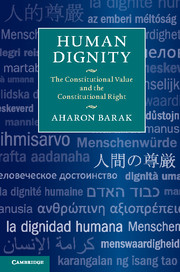Book contents
- Frontmatter
- Contents
- Preface
- Acknowledgements
- Table of Cases
- Part I Fundamental concepts and sources
- 1 The various aspects of human dignity
- 2 The intellectual history of the social value of human dignity
- 3 Human dignity as a value and as a right in international documents
- 4 Human dignity as a value and as a right in constitutions
- Part II Human dignity as a constitutional value
- Part III Human dignity as a constitutional right
- Part IV Human dignity in comparative law
- Bibliography
- Index
- References
4 - Human dignity as a value and as a right in constitutions
Published online by Cambridge University Press: 05 February 2015
- Frontmatter
- Contents
- Preface
- Acknowledgements
- Table of Cases
- Part I Fundamental concepts and sources
- 1 The various aspects of human dignity
- 2 The intellectual history of the social value of human dignity
- 3 Human dignity as a value and as a right in international documents
- 4 Human dignity as a value and as a right in constitutions
- Part II Human dignity as a constitutional value
- Part III Human dignity as a constitutional right
- Part IV Human dignity in comparative law
- Bibliography
- Index
- References
Summary
Pre-First World War developments
The intellectual history of human dignity is found predominantly in religious, philosophical and social discourse. Human dignity was not part of the legal discourse. Almost none of the national constitutions included any mention of human dignity before the First World War. In those rare cases in which human dignity was mentioned in a constitution or in a document of constitutional importance, it related to human dignity as honor. Thus, for example, in the English Bill of Rights of 1689, a succession arrangement was determined “to hold the crown and royal dignity.” The term “dignity” here is not the human dignity that is the subject of this book. The same is true regarding the Declaration of the Rights of Man and of the Citizen adopted during the French revolution in 1789. It determines, inter alia:
Tous les Citoyens étant égaux à ses yeux sont également admissibles à toutes dignités, places et emplois publics, selon leur capacité, et sans autre distinction que celle de leurs vertus et de leurs talents.
The “dignités” in this article pertains to honor, and not the dignity that we are discussing.
Development from the First World War until the Second World War
A change in the constitutional status of human dignity occurred after the First World War. The first constitution that related to dignity seems to be the Constitution of Finland (July 1919). One of its provisions determined that every Finnish citizen shall have the law’s protection of his life, dignity, personal liberty and property. In the same year, the Weimar Constitution (August 1919) determined that the organization of economic life must fit the principles of justice in order to ensure that everyone may lead a life suitable for a human being. The term used in this respect was menschenwürdigen, regarding human dignity. A similar provision was added in 1920 to the permanent constitution of Estonia. In the Constitution of Lebanon (1926), the dignity of religion was safeguarded. The Constitution of Ecuador (1929) included a provision similar to that in the Weimar Constitution, according to which the organization of economic life must be based upon the principles of justice in order to ensure general growth, and through it to ensure a quality of life that is in line with human dignity (dignidad humana).
- Type
- Chapter
- Information
- Human DignityThe Constitutional Value and the Constitutional Right, pp. 49 - 66Publisher: Cambridge University PressPrint publication year: 2015
References
- 1
- Cited by



